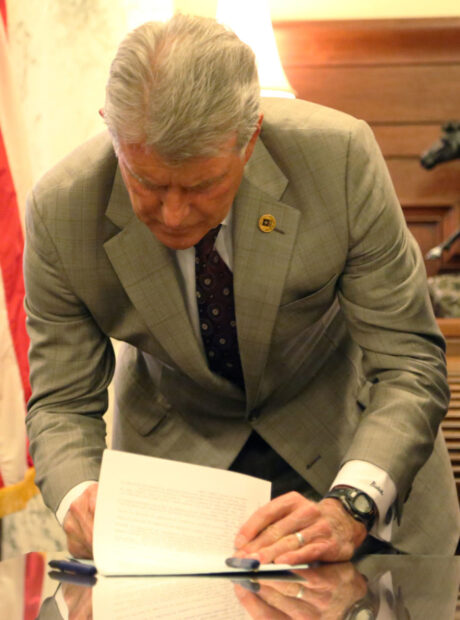Gov. Butch Otter signed a pair of literacy bills into law Wednesday — and pledged to get results with the new funding that’s on its way.
“Our work is just beginning,” said Otter.

The two bills, which now become law on July 1, represent the policy end of Otter’s literacy initiative. House Bill 526 will require school districts to provide 30 to 60 hours of extra help to kindergartners through third-graders who are not reading at grade level. House Bill 451 would require parents to be notified if their children are reading below grade level.
Still to come is the funding piece of the equation. Legislative budget-writers earmarked $9.1 million to launch the program, and lawmakers still need to pass this spending bill.
Otter requested $10.7 million, and conceded that he would have liked the additional funding. However, he also said the state’s schools can work with the $9.1 million.
According to recent results on the Idaho Reading Indicator, nearly 37,000 students would be eligible for extra help. A $10.7 million budget equates to about $290 per student; the Legislature’s funding plan equates to about $245 per student.
Both Otter and Rep. Wendy Horman downplayed the budget differences. Horman — an Idaho Falls Republican who worked on this year’s K-12 budget bills — pointed out that $9.1 million piggybacks onto $2.1 million the state already spends on literacy programs.
Otter made a similar argument in a news release touting the literacy bills.
On other education topics:
STEM. Otter also signed a pair of bills aimed at supporting the “STEM” disciplines of science, technology, engineering and math.
And here again, he downplayed differences on funding.
Otter signed Senate Bill 1279, which would create a standalone STEM Education Fund, and House Bill 379, which would launch a computer science initiative to provide training for teachers and establish new classroom standards.
Otter had hoped to put $10 million into the STEM Education Fund — spending $2 million on computer science and putting the rest into a long-term endowment. Legislators wrote a $2 million budget instead.
Otter said he was “a little disappointed” with the $2 million budget, and said the added funding would have helped the state secure matching donations from industry. Here as well, Otter said he hopes to show results to the 2017 Legislature.
“Performance is going to get acceptance,” he said.
Bible bill. Otter would not tip his hand on Senate Bill 1342, a bill that would clarify the role of religious texts in the classroom. The bill, which is headed to Otter’s desk, says teachers can use the Bible and other religious texts in the classroom.
Attorney General Lawrence Wasden’s office says the bill violates the Idaho Constitution.
Otter said he is pretty sure what he will do with the bill, but would not elaborate. “I still have a couple more people I need to talk to.”
